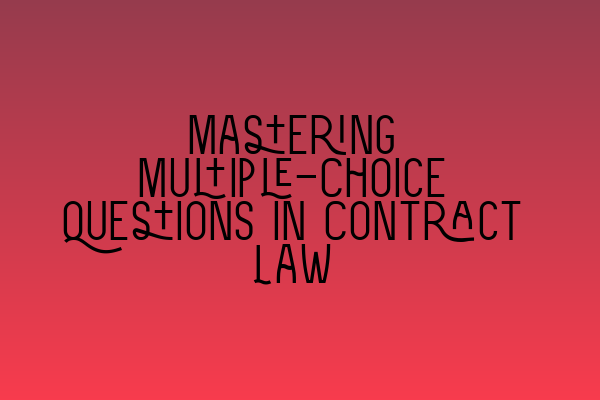Mastering Multiple-Choice Questions in Contract Law
Are you preparing for your contract law exam and feeling overwhelmed by the prospect of tackling multiple-choice questions? You’re not alone. Many law students struggle with these questions, as they require a deep understanding of the subject matter and the ability to analyze complex legal scenarios. But fear not! In this blog post, we will provide you with practical tips and strategies to help you master multiple-choice questions in contract law.
Understanding the Format
Before diving into the strategies, let’s first understand the format of multiple-choice questions commonly used in contract law exams. These questions consist of a stem – which is the question or the incomplete statement – followed by a list of options. Your task is to select the most appropriate answer from the provided options. While multiple-choice questions may seem straightforward, they often require careful consideration and critical thinking to select the correct answer.
1. Read the Stem Carefully
The key to success in multiple-choice questions is careful reading. Start by reading the stem of the question carefully. Make sure you understand what the question is asking and identify any key terms or phrases that can provide clues to the correct answer. Focus on the details and nuances of the question to avoid falling into common traps.
2. Identify the Issue
Once you have grasped the question’s context, identify the underlying legal issue it presents. Is it a question about offer and acceptance? Is it related to contractual interpretation? By identifying the issue, you can narrow down your options and focus your analysis on the relevant legal principles.
3. Eliminate Wrong Answers
One effective strategy is to eliminate the obviously wrong answers. Cross out any options that are clearly incorrect or inconsistent with the facts presented in the question. This process of elimination can increase your chances of choosing the correct answer by reducing the number of options you need to consider.
4. Compare and Contrast
When you are left with multiple plausible options, it’s time to compare and contrast them. Look for key differences and similarities among the remaining options. Sometimes, the correct answer can be identified by contrasting it with the incorrect options. Pay close attention to small but significant details that differentiate the choices from one another.
5. Apply Legal Principles
To choose the correct answer, you need to apply the relevant legal principles to the facts of the question. Analyze the options and consider how each one aligns with the legal rules and principles you have learned. Remember to support your choice with solid reasoning, referring to the specific legal concepts that apply.
6. Practice, Practice, Practice
Like any skill, mastering multiple-choice questions in contract law requires practice. Familiarize yourself with past exam papers and practice answering multiple-choice questions under timed conditions. This will help you improve your speed, accuracy, and confidence in selecting the correct answers.
Conclusion
Mastering multiple-choice questions in contract law is an essential skill for any aspiring lawyer. By following the strategies outlined in this blog post and practicing regularly, you can improve your ability to analyze legal scenarios, apply legal principles, and select the correct answers.
Remember, preparation is key. Enhance your understanding of contract law by exploring related legal topics such as the impact of frustration on contractual obligations, interpreting contractual clauses, the legal aspects of business contracts, agreements in contract law, and the comparison between SQE contract law and traditional qualifications. These articles will provide you with deeper insights and broaden your knowledge base.
Now, armed with the strategies and knowledge provided here, go forth and conquer those multiple-choice questions! Good luck with your contract law exam!
